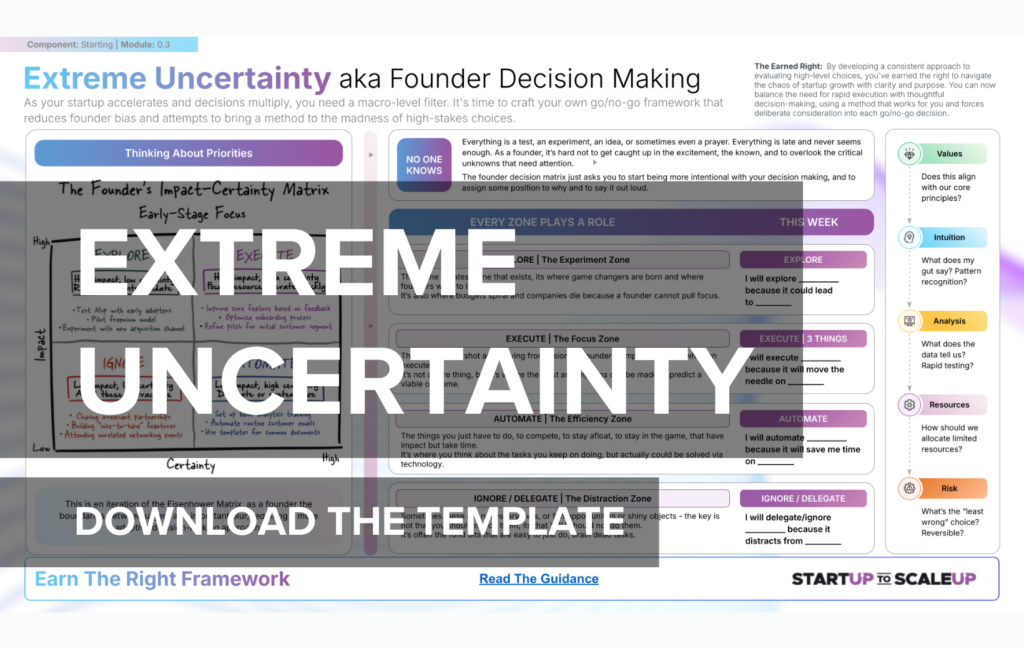How Can Startup Founders Navigate Extreme Uncertainty?
Why is extreme uncertainty a defining characteristic of startup life?
Extreme uncertainty is inherent to startup life because founders are often venturing into uncharted territory. They’re creating new products, entering untested markets, or disrupting established industries. This means:
- Limited precedent: There’s often no clear roadmap to follow.
- Rapid change: Market conditions and technologies evolve quickly.
- Resource constraints: Limited time, money, and personnel add pressure.
- Multiple unknowns: From product-market fit to scalability, many factors remain uncertain.
Embracing this uncertainty is crucial. It’s not about eliminating it, but learning to navigate and even thrive within it.
How can startup founders approach decision-making in uncertain environments?
Effective decision-making in uncertain environments involves:
- Embracing imperfect information: Accept that you’ll never have all the data.
- Using frameworks: Implement structured approaches to evaluate decisions.
- Balancing intuition and analysis: Combine gut feelings with data-driven insights.
- Setting clear criteria: Define what success looks like for each decision.
- Considering reversibility: Prioritize decisions that can be easily changed if needed.
One useful framework is the Impact-Certainty Matrix, which categorizes decisions based on their potential impact and the level of certainty around outcomes.
What is the Impact-Certainty Matrix and how can it help startup founders?
The Impact-Certainty Matrix is a decision-making tool that helps founders prioritize actions based on two factors:
- Potential impact on the business
- Level of certainty about the outcome
It divides decisions into four quadrants:
- Explore (High Impact, Low Certainty): Run experiments and validate assumptions.
- Execute (High Impact, High Certainty): Act decisively on these opportunities.
- Automate (Low Impact, High Certainty): Delegate or systematize these tasks.
- Ignore (Low Impact, Low Certainty): Avoid wasting resources on these.
This framework helps founders focus on high-impact activities while managing risk effectively.
How can startup founders maintain focus and avoid distractions in chaotic environments?
Maintaining focus in chaotic environments requires:
- Clear prioritization: Use tools like the Impact-Certainty Matrix to identify what truly matters.
- Regular reflection: Set aside time to step back and reassess your direction.
- Saying no: Be willing to decline opportunities that don’t align with your core goals.
- Building routines: Establish processes that create structure amidst chaos.
- Delegating effectively: Trust your team to handle certain tasks, freeing you to focus on critical areas.
Remember, not every “urgent” matter is truly important. Develop the discipline to distinguish between the two.
What strategies can help startup founders manage risk in highly uncertain situations?
Effective risk management strategies for startups include:
- Diversification: Don’t put all your eggs in one basket, whether it’s products, markets, or strategies.
- Rapid iteration: Test ideas quickly and cheaply to learn fast.
- Building flexibility: Create systems and processes that can adapt to changing circumstances.
- Scenario planning: Anticipate potential outcomes and prepare contingencies.
- Maintaining a cash buffer: Ensure you have runway to weather unexpected challenges.
The goal isn’t to eliminate risk, but to make it manageable and even leverage it for competitive advantage.
How can startup founders balance quick action with strategic thinking?
Balancing quick action with strategic thinking involves:
- Setting a clear vision: Establish long-term goals to guide short-term actions.
- Creating decision-making frameworks: Use tools like the Impact-Certainty Matrix to evaluate choices quickly.
- Scheduling strategic time: Regularly step back from day-to-day operations to think big picture.
- Building a diverse team: Surround yourself with people who complement your skills and perspective.
- Embracing iterative planning: Treat your strategy as a living document, regularly updated based on new information.
The key is to create a system where quick decisions align with your overall strategy, allowing for both agility and direction.
Navigating extreme uncertainty is a core competency for startup founders. By embracing frameworks for decision-making, maintaining focus on high-impact activities, and balancing quick action with strategic thinking, founders can turn uncertainty into opportunity.
The goal isn’t to eliminate uncertainty, but to thrive within it, using it as a catalyst for innovation and growth.
